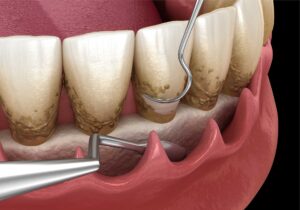
Why do I need it?
Root planing and scaling is a deep cleansing beneath the gum line to combat gum disease.
The cause of gum disease lies in a coating of bacteria referred to as plaque. Plaque forms constantly on your teeth. However, when they’re not properly cleaned the plaque-forming bacteria can cause your gums to become irritated. If this happens the gums begin to slide off from the teeth and create pockets. A plaque will then get trapped in the pockets and cannot be eliminated by regular brushing. If left untreated gum disease may result in tooth and bone loss.
If gum disease has been detected early enough and hasn’t affected the structures beneath that gumline, an expert cleaning is recommended. If the spaces between your teeth and gums aren’t deep enough, however scaling and root planning could be required.
A study published in July 2015 published in The Journal of the American Dental Association shows that root planing and scaling are beneficial for patients suffering from persistent periodontitis (gum disease that has progressed beyond gingivitis). Chronic periodontitis is a problem that affects 47.2 percent of those older than 30 in the United States.
What happens during the process of scaling or Root Planning?
This deep cleansing consists of two components. Scaling occurs when your dentist takes away all dental plaque as well as tartar (hardened plaque) over and below the gum line. Be sure to scrub from the top into the pocket’s bottom. Your dentist will then start root planning, smoothing the roots of your teeth to aid the gums reconnect the teeth. Root planing and scaling may require more than one visit to complete and could require an anesthetic local to the area.
Tips for AfterCare
Following a thorough cleaning it is possible to experience pain for one or two, and sensitivity to your teeth for up to one week. Your gums may also be tender, swollen, and even bleed.
To avoid infection, manage the pain or assist in healing your dental health, your dentist could prescribe a medicine or mouthwash. Your dentist may also insert medication (subantimicrobial-dose doxycycline) directly into the pocket that was cleaned.
Your dentist will arrange a follow-up appointment to check how your gums are healing and to determine the size that your gums. If they’ve become deeper the need for further treatment is required.
Proper dental hygiene at home is crucial to prevent the gum condition from getting severe or ongoing. Clean your teeth twice per every day using a soft toothbrush as well as floss between your teeth on a regular basis, consume healthy and balanced meals, refrain from smoking tobacco and visit your dentist frequently.
Call Us for an Appointment at +923463297429
Leave a reply